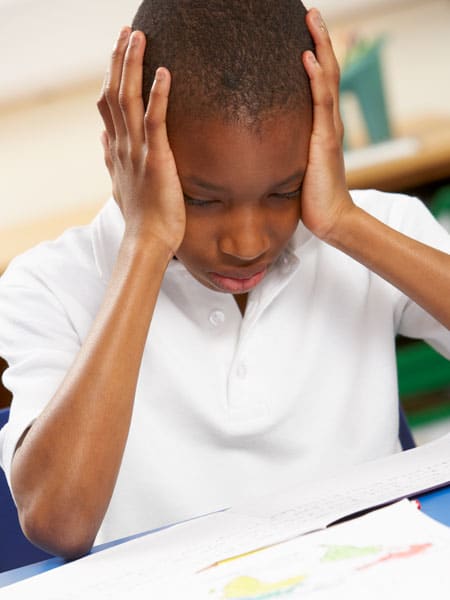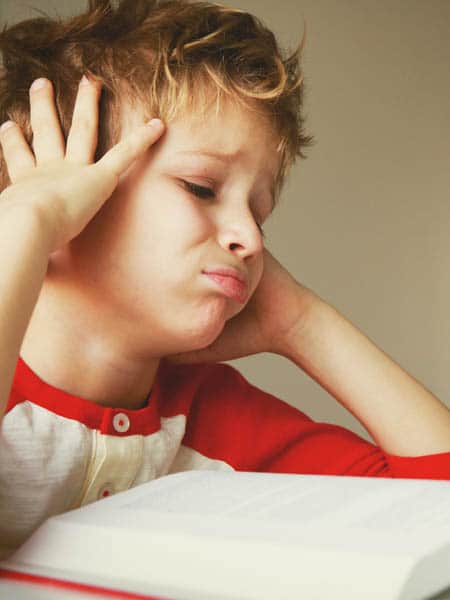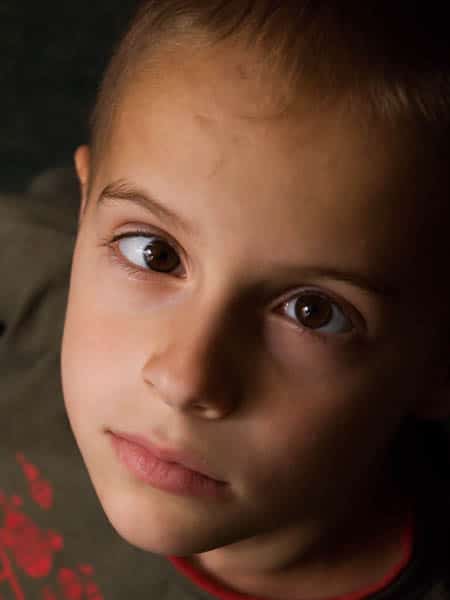Vision Therapy
Symptoms of Vision Disorders

Vision Therapy / Symptoms of Vision Disorders
Symptoms of Underlying Vision Disorders
Could Your Child Need Vision Therapy?
A child’s world almost always makes sense to him or her. That said, a child only knows what the world looks like to them from the inside looking out. They most likely have no real idea what the experience of seeing is “supposed” to be like. So, you can’t count on a child to know on their own when there’s a problem and report it to you. It helps to know how to read the possible signs.
Vision problems in children can also cause teachers or parents to suspect learning disabilities. If your child has a reputation for being lazy, for having a “behavioral problem,” or for being a slow learner, but if you believe that assessment doesn’t fit your child, then it would be prudent to have their vision evaluated. This applies for children who have unexplained problems writing, trouble completing and/or turning in homework on time, or issues with their homework taking longer than it should.

Vision Therapy / Symptoms of Vision Disorders
Vision Problems Can Cause Physical Symptoms or Discomfort
Problems seeing properly can absolutely cause other physical symptoms or discomfort.
Children who are slow to learn to read or who read “below average” for their age may very well be suffering from vision problems. If it seems like your child has a lot of trouble with reading comprehension, or has a tendency to skip small words and/or skip lines when reading aloud, then it’s certainly a possibility.
Many children with vision problems can also display trouble paying attention while reading. They may appear to become tired during the reading process, or seem to be avoiding activities that require them to read or perform other “close work,” either in school or at home.
Problems seeing properly can absolutely cause other physical symptoms or discomfort. Does your child complain of headaches when reading, doing homework, or after putting in a full day at school? Are they unusually clumsy or prone to knocking over objects? Do they appear to misjudge distances on a regular basis? Do they get carsick as a rule? Do they have trouble with sports or Physical Ed? If so, then a vision problem could well be a factor.
If you suspect that a vision problem could potentially be an issue for your child, watch for other signs that could confirm your suspicions. Many children with vision issues will tilt their head or close one eye when attempting to read or see objects from far away. They may also rub their eyes, complain that their eyes burn, or squint excessively.

Vision Therapy / Symptoms of Vision Disorders
Most Children Do Not Know They Have a Problem
Remember that your child may not be able to identify a problem or know that they should come to you about it if they suspect one. The sooner you bring them in for a vision evaluation, the sooner you can determine whether or not assistance or treatment is needed. The sooner an issue is identified and dealt with, the sooner your child will be able to improve their quality of life!
Keep in mind that thorough evaluation of a child’s vision doesn’t start and stop at a routine eye exam at school or at the pediatrician’s office. If your child has been found to have 20/20 vision via a routine exam, or they already wear corrective lenses, but they still show evidence of having vision trouble, Vision Therapy may be able to help. Consider bringing them in for a full vision evaluation at Vision Care and Therapy Center, sooner rather than later. The sooner the child is evaluated, the sooner the two of you can start working together to correct the problem.

Vision Therapy / Symptoms of Vision Disorders
Common Underlying Symptoms
Easy to Observe Symptoms
- Crossed or lazy eye
- Frequent tilting of head to one side. (one shoulder is noticeably higher)
- Excessive squinting, blinking, and/or closing of one eye
- Places head next to book while reading
- Poor visual/motor skills (“hand-eye coordination”)
- Frequently bumps into things or drops things, is “clumsy”
- Difficulties catching and/or throwing airborne objects
- Appears to favor the use of one eye
- Burning or itching eyes, reddened in appearance
- Headaches in forehead or temples
- Exhibits posture problems
Common Behavior Symptoms
- Short attention span
- Nervous, irritable, or quickly fatigued while reading, looking at books, or doing close work
- Displays signs of emotional or developmental immaturity
- Low frustration level, doesn’t get along well with others
- Nausea or dizziness
- Motion sickness
Common Work Related Symptoms
- Repeatedly confuses left and right directions
- Holds the book or object unusually close
- Twists or tilts head toward a book or object to favor one eye
- Frequently loses place when reading or copying from the board or paper
- Difficulty remembering what was read
- Difficulty remembering, identifying and reproducing geometric shapes
- Often reverses words
- Uses finger to read
- Rubs eyes during or after short periods of reading
- Frequently skips words and/or needs to re-read
- Repeatedly omits small words
- Struggles with handwriting
- Moves head back and forth (instead of moving eyes)
- Experiences blurry vision
- Experiences double vision
Take Our Self Assessment Survey
Here is a quick Quick Self Assessment Survey to help determine if your or your child may have symptoms of a common visual problem called Convergence Insufficiency. Consider scheduling a developmental vision evaluation if the score is greater than 15.
Click Here for Survey

Vision Therapy / Symptoms of Vision Disorders
We Can Help
We provide comprehensive eye examinations for children and adults.
In addition, we also provide vision evaluations for those with special needs, autism, and Asperger’s Syndrome, as well as those who have suffered a stroke, traumatic brain injury, or concussion.
Vision Care and Therapy Center is dedicated to providing the highest quality eye care for our patients. The first step is to schedule a comprehensive Vision Exam with one of our doctors and our team of highly trained therapists.
This comprehensive exam includes testing for visual processing, tracking, reading speed, reading comprehension, balance, eye teaming, depth perception, and more. It is a comprehensive binocular vision exam that goes beyond just measuring 20/20.

Click here to learn how Vision Care & Therapy Center Can Help!
CONTACT US
Vision Care & Therapy Center

Dr. Janna Iyer, FCOVD
Dr. Alayna Larsen
11735 Pointe Place
Roswell, Ga 30076
678-256-3990
Office Hours
Mon-Thu 9:00am-6:00pm
Fri 9:00am-1:00pm
Appointments
678-256-3990
Patient Infomation




